On an early spring day in 1959, Edward Hunter testified before a US Senate subcommittee investigating “the effect of Red China Communes on the United States.” It was the kind of opportunity he relished. A war correspondent who had spent considerable time in Asia, Hunter had achieved brief media stardom in 1951 after his book Brain-Washing in Red China introduced a new concept to the American public: a supposedly scientific system for changing people’s minds, even making them love things they once hated.
But Hunter wasn’t just a reporter, objectively chronicling conditions in China. As he told the assembled senators, he was also an anticommunist activist who served as a propagandist for the OSS, or Office of Strategic Services—something that was considered normal and patriotic at the time. His reporting blurred the line between fact and political mythology.
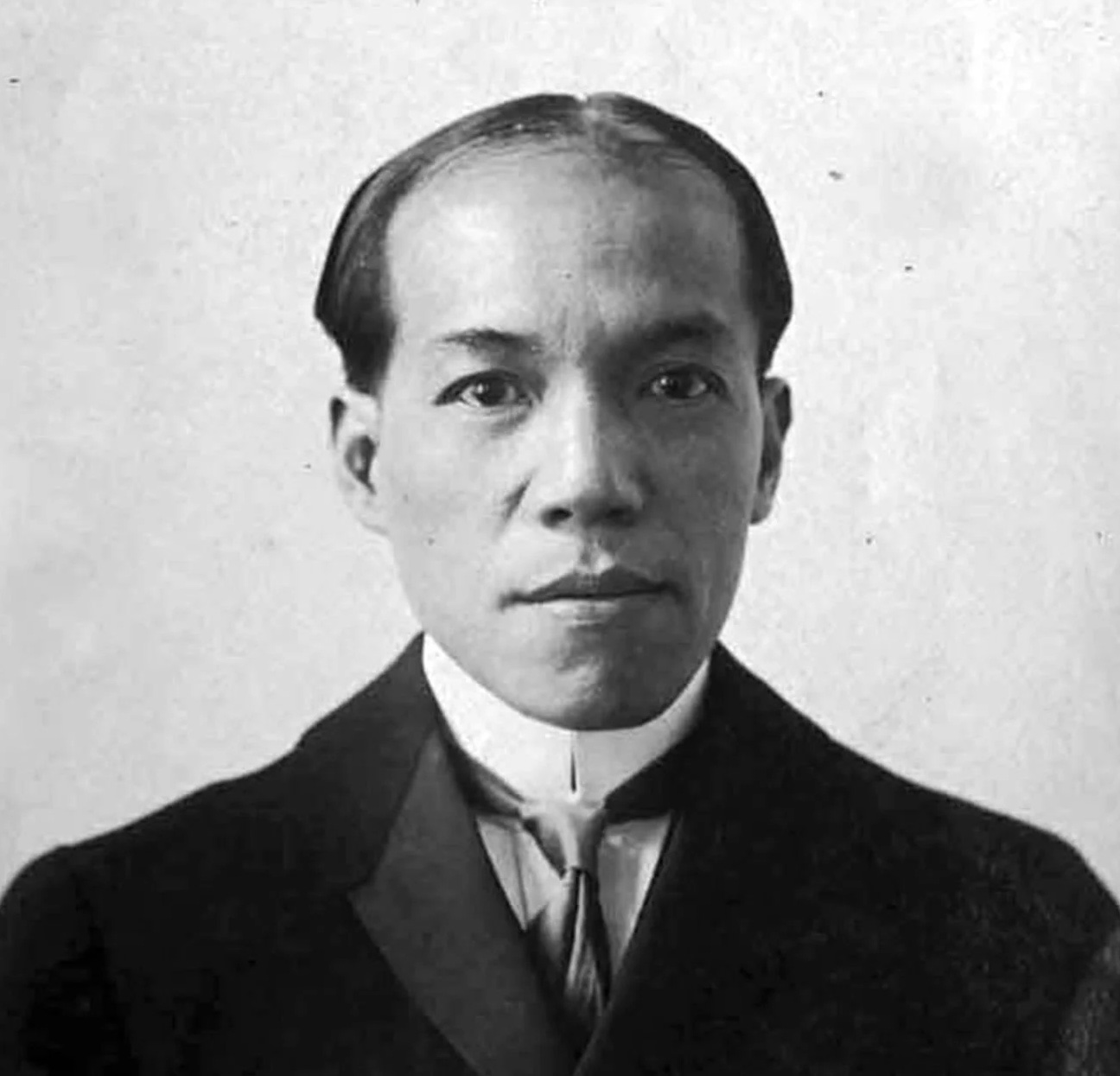
When a senator asked about Hunter’s work for the OSS, the operative boasted that he was the first to “discover the technique of mind-attack” in mainland China, the first to use the word “brainwashing” in writing in any language, and “the first, except for the Chinese, to use the word in speech in any language.”
None of this was true. Other operatives associated with the OSS had used the word in reports before Hunter published articles about it. More important, as the University of Hong Kong legal scholar Ryan Mitchell has pointed out, the Chinese word Hunter used at the hearing—xinao (), translated as “wash brain”—has a long history going back to scientifically minded Chinese philosophers of the late 19th century, who used it to mean something more akin to enlightenment.
Yet Hunter’s sensational tales still became an important part of the disinformation and pseudoscience that fueled a “mind-control race” during the Cold War, much like the space race. Inspired by new studies on brain function, the US military and intelligence communities prepared themselves for a psychic war with the Soviet Union and China by spending millions of dollars on research into manipulating the human brain. But while the science never exactly panned out, residual beliefs fostered by this bizarre conflict continue to play a role in ideological and scientific debates to this day.
Coercive persuasion and pseudoscience
Ironically, “brainwashing” was not a widely used term among communists in China. The word xinao, Mitchell told me in an email, is actually a play on an older word, xixin, or washing the heart, which alludes to a Confucian and Buddhist ideal of self-awareness. In the late 1800s, Chinese reformists such as Liang Qichao began using xinao—replacing the character for “heart” with “brain”—in part because they were trying to modernize Chinese philosophy. “They were eager to receive and internalize as much as they could of Western science in general, and discourse about the brain as the seat of consciousness was just one aspect of that set of imported ideas,” Mitchell said.
For Liang and his circle, brainwashing wasn’t some kind of mind-wiping process. “It was a sort of notion of epistemic virtue,” Mitchell said, “or a personal duty to make oneself modern in order to behave properly in the modern world.”
Meanwhile, scientists outside China were investigating “brainwashing” in the sense we usually think of, with experiments into mind clearing and reprogramming. Some of the earliest research into the possibility began in the 1890s, when Ivan Pavlov, the Russian physiologist who had famously conditioned dogs to drool at the sound of a bell, worked on Soviet-funded projects to investigate how trauma could change animal behavior. He found that even the most well-conditioned dogs would forget their training after intensely stressful experiences such as nearly drowning, especially when those were combined with sleep deprivation and isolation. It seemed that Pavlov had hit upon a quick way to wipe animals’ memories. Scientists on both sides of the Iron Curtain subsequently wondered whether it might work on humans. And once memories were wiped, they wondered, could something else be installed their place?
During the 1949 show trial of the Hungarian anticommunist József Mindszenty, American officials worried that the Russians might have found the answer. A Catholic cardinal, Mindszenty had protested several government policies of the newly formed, Soviet-backed Hungarian People’s Republic. He was arrested and tortured, and he eventually made a series of outlandish confessions at trial: that he had conspired to steal the Hungarian crown jewels, start World War III, and make himself ruler of the world. In his book Dark Persuasion, Joel Dimsdale, a psychiatry professor at the University of California, San Diego, argues that the US intelligence community saw these implausible claims as confirmation that the Soviets had made some kind of scientific breakthrough that allowed them to control the human mind through coercive persuasion.
This question became more urgent when, in 1953, a handful of American POWs in China and Korea switched sides, and a Marine named Frank Schwable was quoted on Chinese radio validating the communist claim that the US was testing germ warfare in Asia. By this time, Hunter had already published a book about brainwashing in China, so the Western public quickly gravitated toward his explanation that the prisoners had been brainwashed, just like Mindszenty. People were terrified, and this was a reassuring explanation for how nice American GIs could go Red.

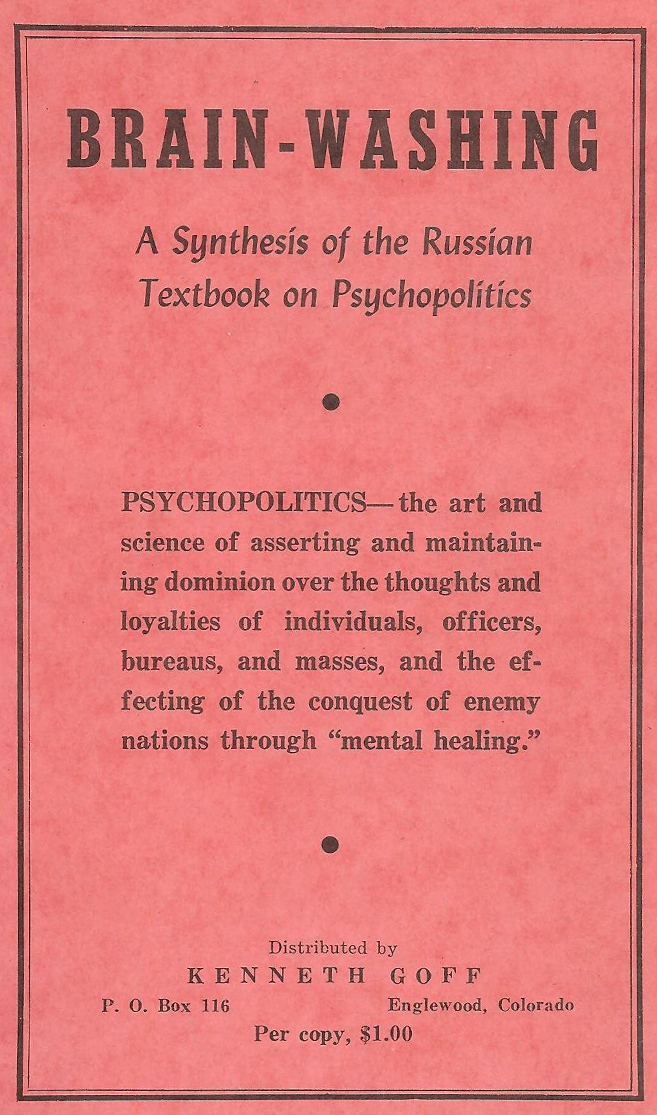
Over the following years, in the wake of the Korean War, “brainwashing” grew into a catchall explanation for any kind of radical or nonconformist behavior in the United States. Social scientists and politicians alike latched onto the idea. The Dutch psychologist Joost Meerloo warned that television was a brainwashing machine, for example, and the anticommunist educator J. Merrill Root claimed that high schools brainwashed kids into being weak-willed and vulnerable to communist influence. Meanwhile, popular movies like 1962’s The Manchurian Candidate, starring Frank Sinatra, offered thrilling tales of Chinese communists whose advanced psychological techniques turned unsuspecting American POWs into assassins.
For the military and intelligence communities, mind control hovered between myth and science. Nowhere is this more obvious than in the peculiar case of an anonymously published 1955 pamphlet called Brain-Washing: A Synthesis of the Russian Textbook on Psychopolitics, which purported to be a translation of work by the Soviet secret-police chief Lavrentiy Beria. Full of wild claims about how the Soviets used psychology and drugs to control the masses, the pamphlet has a peculiar section devoted to the ways that Dianetics—a pseudoscience invented by the founder of Scientology, L. Ron Hubbard—could prevent brainwashing. As a result, it is widely believed that Hubbard himself wrote the pamphlet as black propaganda, or propaganda that masquerades as something produced by a foreign adversary.
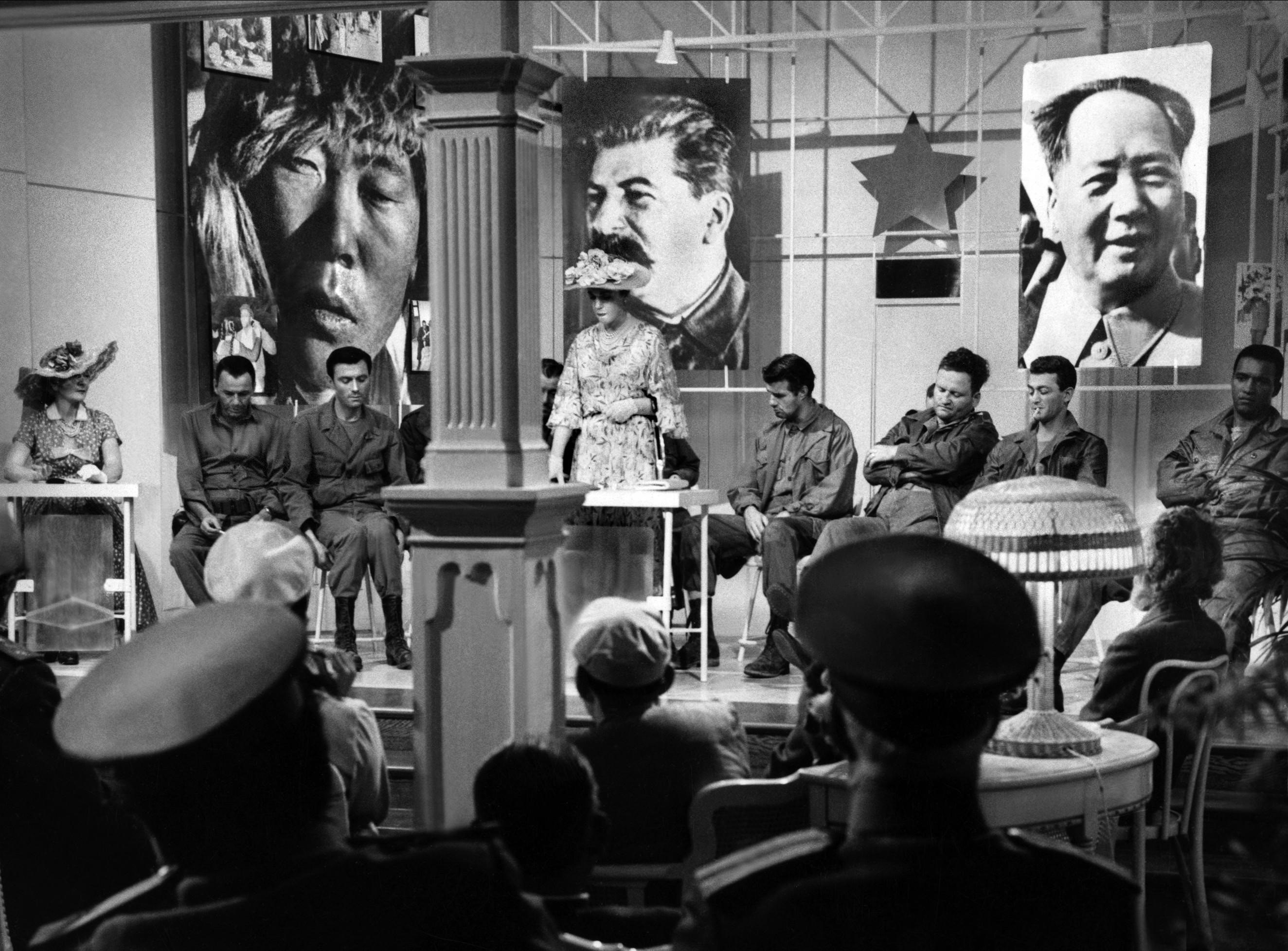
Still, US officials apparently took it seriously. David Seed, a cultural studies scholar at the University of Liverpool, plumbed the National Security Council papers at the Dwight D. Eisenhower Library, where he discovered that the NSC’s Operations Coordinating Board had analyzed the pamphlet as part of an investigation into enemy capabilities. A member of the board wrote that it might be “fake” but contained so much accurate information that it was clearly written by “experts.” When it came to brainwashing, government operatives made almost no distinction between black propaganda and so-called expertise.
This gobbledygook may also have struck the NSC investigator as legitimate because Hubbard borrowed lingo from the same sources as many scientists of the era. Hubbard chose the name Dianetics, for instance, specifically to evoke the computer scientist Norbert Wiener’s idea of cybernetics, an influential theory about information control systems that heavily informed both psychology and the burgeoning field of artificial intelligence. Cybernetics suggested that the brain functioned like a machine, with inputs and outputs, feedback and control. And if machines could be optimized, then why not brains?
An excuse for government abuse
The fantasy of brainwashing was always one of optimization. Military experts knew that adversaries could be broken with torture, but it took months and was often a violent, messy process. A fast, scientifically informed interrogation method would save time and could potentially be deployed on a mass scale. In 1953, that dream led the CIA to invest millions of dollars in MK-Ultra, a project that injected cash into university and research programs devoted to memory wiping, mind control, and “truth serum” drugs. Worried that their rivals in the Soviet Union and China were controlling people’s minds to spread communism throughout the world, the intelligence community was willing to try almost anything to fight back. No operation was too weird.
One of MK-Ultra’s most notorious projects was “Operation Midnight Climax” in San Francisco, where sex workers lured random American men to a safe house and dosed them with LSD while CIA agents covertly observed their behavior. At McGill University in Montreal, the CIA funded the work of the psychologist Donald Cameron, who used a combination of drugs and electroconvulsive therapy on patients with mental illness, attempting to erase and “repattern” their minds. Though many of his victims did wind up suffering from amnesia for years, Cameron never successfully injected new thoughts or memories. Marcia Holmes, a science historian who researched brainwashing for the Hidden Persuaders project at Birkbeck, University of London, told me that the CIA used Cameron’s data to develop new kinds of torture, which the US adopted as “enhanced interrogation” techniques in the wake of 9/11. “You could put a scientific spin on it and claim that’s why it worked,” she said. “But it always boiled down to medieval tactics that people knew from experience worked.”
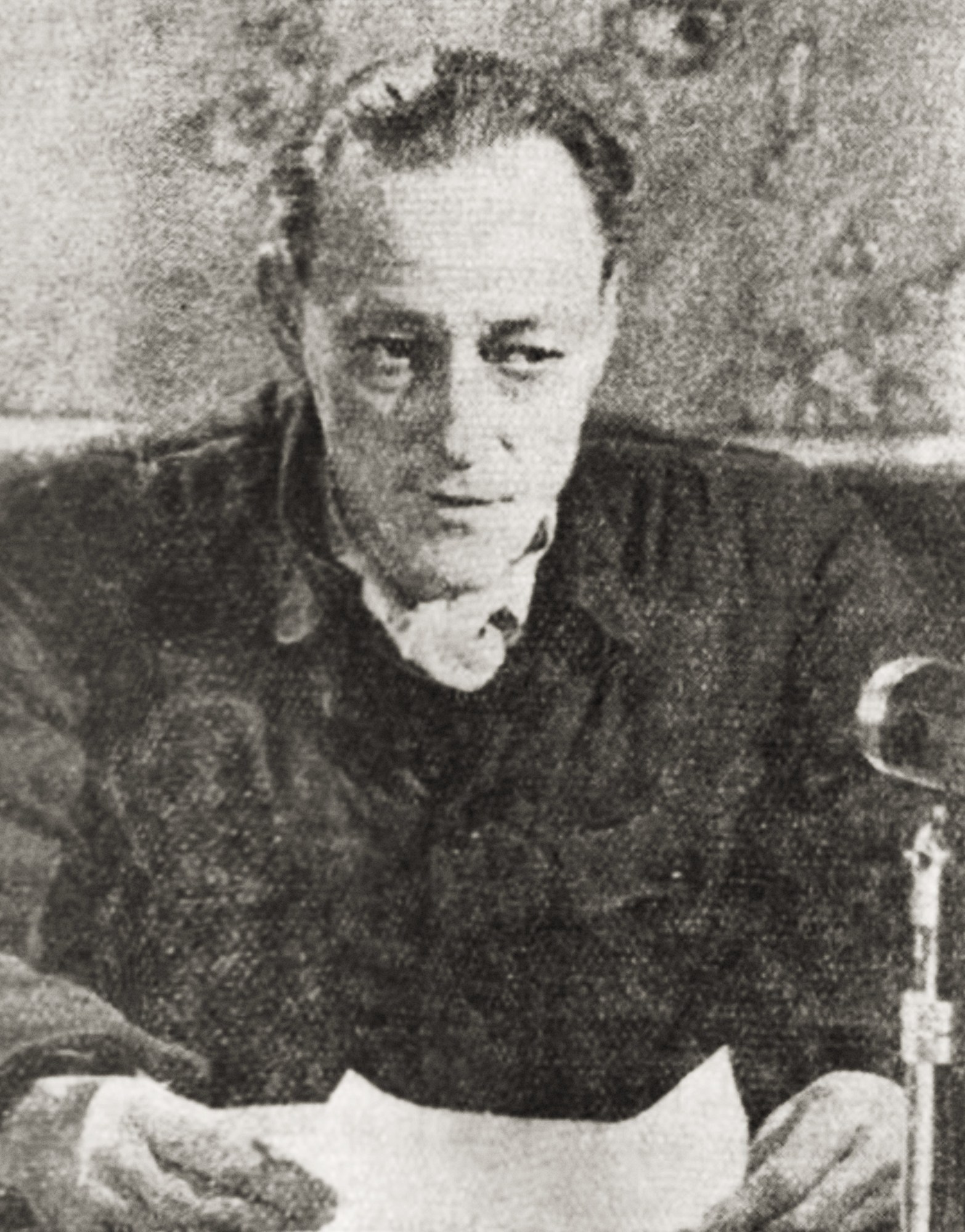

MK-Ultra remained secret until the mid-1970s, when the US Senate Select Committee to Study Governmental Operations with Respect to Intelligence Activities, commonly known as the Church Committee after its chair, Senator Frank Church, opened hearings into the long-running project. The shocking revelations that the CIA was drugging American citizens and paying for the torment of vulnerable Canadians changed the public’s understanding of mind control. “Brainwashing” came to seem less like a legitimate threat from overseas enemies and more like a ruse or excuse for almost any kind of bad behavior. When Patty Hearst, granddaughter of the newspaper publisher William Randolph Hearst, was put on trial in 1976 for robbing a bank after being kidnapped by the Symbionese Liberation Army, an American militant organization, the judge refused to believe experts who testified that she had been tortured and brainwashed by her captors. She was convicted and spent 22 months in jail. This marked the end of the nation’s infatuation with brainwashing, and experts began to debunk the idea that there was a scientific basis for mind control.

Still, the revelations about MK-Ultra led to new cultural myths. Communists were no longer the baddies—instead, people feared that the US government was trying to experiment on its citizens. Soon after the Church Committee hearings were over, the media was gripped by a crime story of epic proportions: nearly two dozen Black children had been murdered in Atlanta, and the police had no leads other than a vague idea that maybe it could be a serial killer. Wayne Williams, a Black man who was eventually convicted of two of the murders, claimed at various points that he had been trained by the CIA. This led to popular conspiracy theories that MK-Ultra had been experimenting on Black people in Atlanta.
Colin Dickey, author of Under the Eye of Power: How Fear of Secret Societies Shapes American Democracy, told me these conspiracy theories became “a way of making sense of an otherwise mystifying and terrifying reality, [which is that America is] a country where Black people are so disenfranchised that their murders aren’t noticed.” Dickey added that this MK-Ultra conspiracy theory “gave a shape to systemic racism,” placing blame for the Atlanta child murders on the US government. In the process, it also suggested that Black people had been brainwashed to kill each other.
No evidence ever surfaced that MK-Ultra was behind the children’s deaths, but the idea of brainwashing continues to be a powerful metaphor for the effects of systemic racism. It haunts contemporary Black horror films like Get Out, where white people take over Black people’s bodies through a fantastical version of hypnosis. And it provides the analytical substrate for the scathing indictment of racist marketing in the book Brainwashed: Challenging the Myth of Black Inferiority, by the Black advertising executive Tom Burrell. He argues that advertising has systematically pushed stereotypes of Black people as second-class citizens, instilling a “slave mindset” in Black audiences.
A social and political phenomenon
Today, even as the idea of brainwashing is often dismissed as pseudoscience, Americans are still spellbound by the idea that people we disagree with have been psychologically captured by our enemies. Right-wing pundits and politicians often attribute discussions of racism to infections by a “woke mind virus”—an idea that is a direct descendant of Cold War panics over communist brainwashing. Meanwhile, contemporary psychology researchers like UCSD’s Dimsdale fear that social media is now a vector for coercive persuasion, just as Meerloo worried about television’s mind-control powers in the 1950s.
Cutting-edge technology is also altering how we think about mind control. In a 2017 open letter published in Nature, an international group of researchers and ethicists warned that neurotechnologies like brain-computer interfaces “mean that we are on a path to a world in which it will be possible to decode people’s mental processes and directly manipulate the brain mechanisms underlying their intentions, emotions and decisions.” It sounds like MK-Ultra’s wish list. Hoping to head off a neuro-dystopia, the group outlined several key ways that companies and universities could guard against coercive uses of this technology in the future. They suggested that we need laws to prevent companies from spying on people’s private thoughts, for example, as well as regulations that bar anyone from using brain implants to change people’s personalities or make them more neurotypical.
Many neuroscientists feel that these concerns are overblown; one of them, the University of Maryland cognitive scientist R. Douglas Fields, summed up the naysayers’ position with a column in Quanta magazine arguing that the brain is more plastic than we realize, and that neurotech mind control will never be as simple as throwing a switch. Kathleen Taylor, another neuroscientist who studies brainwashing, takes a more measured view; in her book Brainwashing: The Science of Thought Control, she acknowledges that neurotech and drugs could change people’s thought processes but ultimately concludes that “brainwashing is above all a social and political phenomenon.”
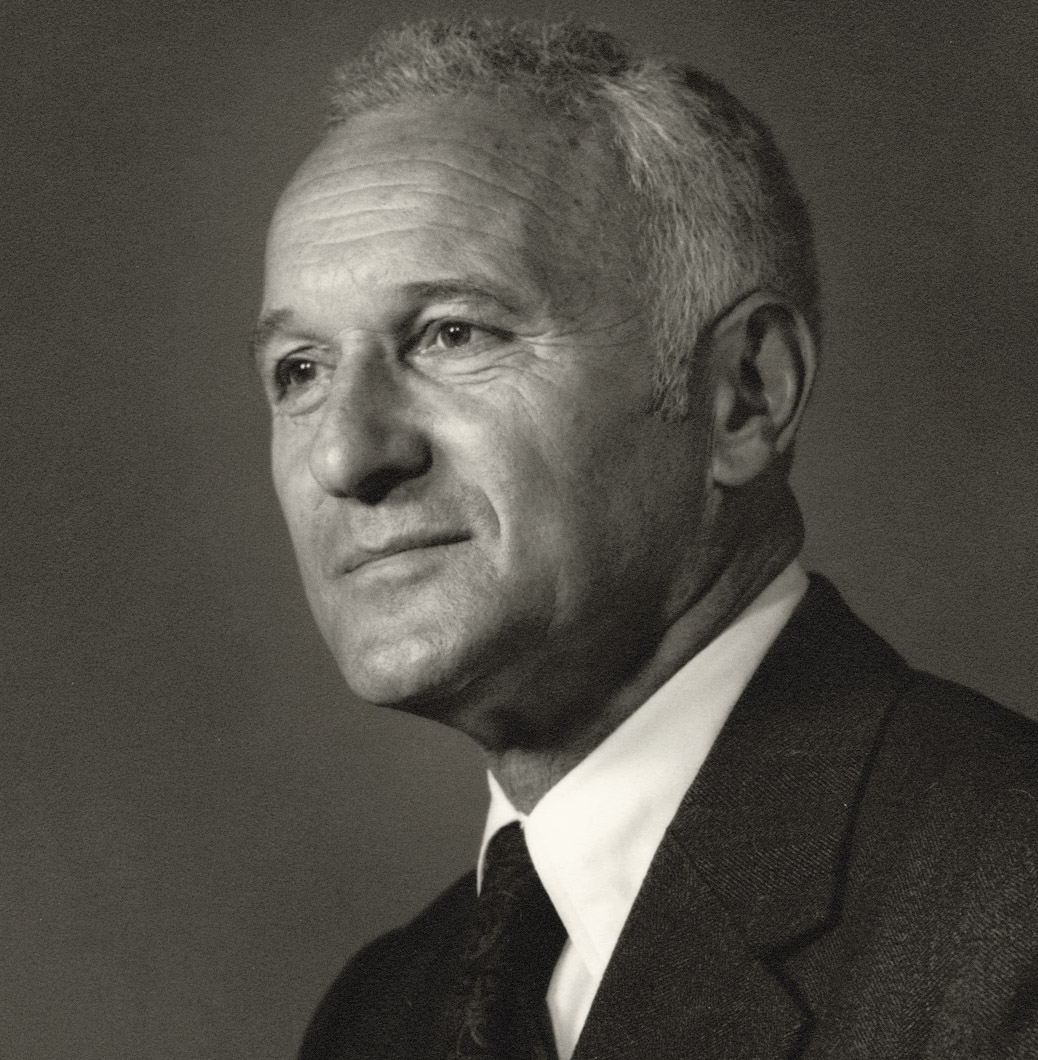
Perhaps that means the anonymous National Security Council examiner was right to call Hubbard’s black propaganda the work of an “expert.” If brainwashing is politics, then disinformation might be as effective (or ineffective) as a brain implant in changing someone’s mind. Still, scholars have learned that political efforts at mind control do not have predictable results. Online disinformation leads to what Juliette Kayyem, a former assistant secretary of the Department of Homeland Security, identifies as stochastic terrorism, or acts of violence that cannot be predicted precisely but can be analyzed statistically. She writes that stochastic terrorism is inspired by online rhetoric that demonizes groups of people, but it’s hard to know which people consuming that rhetoric will actually become terrorists, and which of them will just rage at their computer screens—the result of coercive persuasion that works on some targets and misses others.
American operatives may never have found the perfect system for brainwashing foreign adversaries or unsuspecting citizens, but the US managed to win the mind-control wars in one small way. Mitchell, the legal scholar at Hong Kong University, told me that the American definition of brainwashing, or xinao, is now the dominant way the word is used in modern Chinese speech. “People refer to aggressive advertising campaigns or earworm pop songs as having a xinao effect,” he said. The Chinese government, Mitchell added, uses the term exactly the way the US military did back in the 1950s. State media, for example, “described many Hong Kong protesters in 2019 as having undergone xinao by the West.”
Annalee Newitz is the author of Stories Are Weapons: Psychological Warfare and the American Mind, coming in June 2024.




Post a Comment